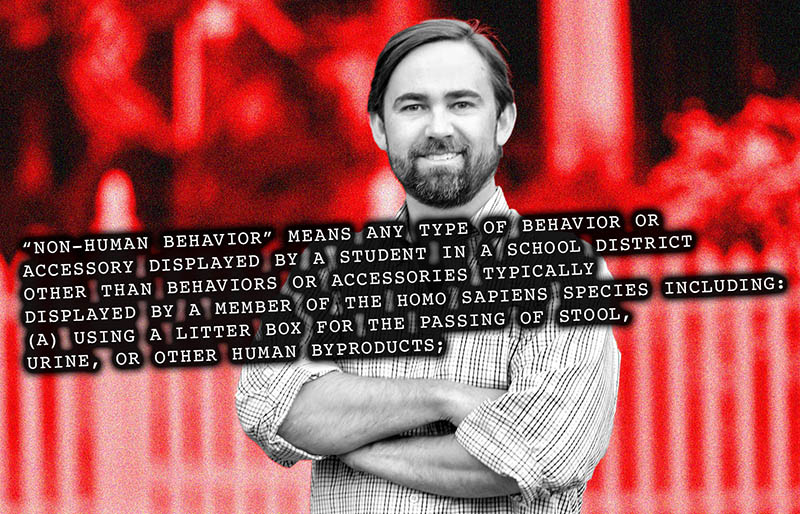Texas AG Pledges to Defend Anti-Sodomy Laws
Texas Attorney General Ken Paxton would be all too happy to defend the state's now-defunct anti-sodomy law in court.

Texas Attorney General Ken Paxton has pledged to defend the state’s now-defunct anti-sodomy law in court if the U.S. Supreme Court revisits the issue of criminalizing consensual same-sex relations.
Speaking with NewsNation anchor Leland Vittert in an interview last Friday, Paxton said that his office would be enforcing Texas anti-abortion statutes and pursuing civil penalties against doctors who provide abortions following the Supreme Court’s overturn of Roe v. Wade.
He noted that even if local Democratic district attorneys refused to pursue criminal charges against doctors, the Republican-led Texas Legislature would likely act to compel them to do so, or face consequences.
Vittert then brought up Justice Clarence Thomas’s concurring opinion overturning Roe, which urged the high court to revisit several cases dealing with “substantive due process” rights that have been recognized by the court but are not explicitly listed in the Constitution.
Among the cases that Thomas suggested revisiting were past rulings dealing with the ability of married couples to use contraception in the privacy of their homes, the right of same-sex couples to marry, and the 2003 Lawrence v. Texas decision, which overturned state laws criminalizing consensual same-sex conduct.
Vittert asked Paxton whether he would support the Texas Legislature passing an anti-sodomy law similar to the one overturned in the Lawrence case, and if he would defend the law in court and bring it to the Supreme Court for reconsideration.
Paxton appeared to be amenable to such a development.
“Yeah, look, my job is to defend state law, and I’ll continue to do that,” Paxton said. “That is my job under the Constitution, and I’m certainly willing and able to do that.”
Echoing many Republicans who prefer that issues relating to so-called “privacy rights” be determined by laws passed by state legislators, rather than imposed by judicial fiat, Paxton argued that laws governing issues like abortion, contraception, and sodomy be debated and determined by elected state lawmakers.
In the Lawrence case, the Supreme Court struck down a 1973 Texas law that criminalized the act of sodomy.
Under the law, anyone convicted of same-sex sodomy would be charged with a Class C misdemeanor, meaning they would have to pay a fine of up to $500 per incident if convicted.
However, some Class C misdemeanors can be enhanced in certain situations, which would typically carry a much larger fine of up to $2,000 and 180 days in county jail.
The Lawrence ruling by the high court overturned a previous Supreme Court decision from 1986 known as Bowers v. Hardwick, in which the court upheld a Georgia anti-sodomy law as constitutional.
That law was much more severe than Texas’s law, both in scope — applying to heterosexual and homosexual partners alike — and in terms of penalty. It required those convicted to serve at least a year in prison, with a sentence of potentially up to 20 years, and to register as sex offenders upon completing their sentence.
According to The New York Times, as recently as 1960, every state in the country had a law banning sodomy.
But since then, dozens of states have repealed such statutes, beginning with Illinois in 1962 and ending, most recently with Idaho, which repealed its anti-sodomy statute in March of 2022 after a failed attempt to repeal the law in 1971.
The District of Columbia repealed its statute in 1993, and Puerto Rico in 2006.
The other conservative justices on the high court, led by Justice Samuel Alito, explicitly tried to separate abortion from other cases involving substantive due process rights, such as the right to engage in consensual same-sex relations.
But the distinction is not legally binding and ignores the fact that much of the legal rationale underlying Roe, including the national scope of the protections it once granted, has been applied to other privacy-related cases, including Lawrence.
As such, any future repeal of Lawrence would send the issue back to the individual states to determine whether to outlaw consensual same-sex relations.
Currently, there are 14 states whose state legislatures have failed to fully repeal their anti-sodomy statutes, either because state courts ruled the law unconstitutional, or because the state has not fully repealed the law, meaning that offenders could be convicted under other similar statutes.
For instance, while Florida’s “crimes against nature” law was technically struck down by the State Supreme Court in 1971, sodomy — should Lawrence be repealed — could still be prosecuted under a separate statute against “unnatural and lascivious acts,” as could adultery.
In another example, the Maryland Court of Appeals issued two rulings and a consent decree in the 1990s protecting the right of heterosexuals to engage in oral sex, homosexuals to engage in oral sex, and homosexuals to engage in anal sex with other consenting adults.
Maryland lawmakers claimed to have repealed the state’s anti-sodomy law in 2020, but only did so partially. As a result, last year, police in Harford County were able to arrest nine men at an adult bookstore and video store, four of whom were charged under the state’s supposedly “repealed” law prohibiting “Perverted Sexual Practice,” according to The Advocate.
Of the 14 states with anti-sodomy laws either fully or partially on the books, 11 have laws outlawing all forms of consensual oral or anal sex, regardless of the participants’ genders. These are Florida, Georgia, Louisiana, Maryland, Massachusetts, Michigan, Minnesota, Mississippi, North Carolina, Oklahoma, and South Carolina. Three other states — Kansas, Kentucky, and Texas — only have laws targeting same-sex consensual conduct.
Even though such laws have rarely been enforced throughout history, some local authorities in those states — as in the Maryland bookstore case — have prosecuted people under those same statutes, despite the Supreme Court’s decision Lawrence still remaining in effect.
Should the Supreme Court revisit Lawrence, it would not be unimaginable to see overzealous police or prosecutors in those 14 states pursuing convictions — even in states like Massachusetts, where the state Supreme Court ruled the state’s anti-sodomy statute to be invalid, but the legislature has failed to officially repeal it.
As far as Paxton is concerned, if Texas were to try and enforce its sodomy law, in the hope of getting the issue back before the nation’s highest court, he seems all too happy to go to war over it.
“I’d have to take a look at it,” he told NewsNation. “This is all new territory for us, so I’d have to [see] how the legislature was laid out and whether we thought we could defend it. Ultimately, if it’s constitutional, we’re going to go defend it.”
Support Metro Weekly’s Journalism
These are challenging times for news organizations. And yet it’s crucial we stay active and provide vital resources and information to both our local readers and the world. So won’t you please take a moment and consider supporting Metro Weekly with a membership? For as little as $5 a month, you can help ensure Metro Weekly magazine and MetroWeekly.com remain free, viable resources as we provide the best, most diverse, culturally-resonant LGBTQ coverage in both the D.C. region and around the world. Memberships come with exclusive perks and discounts, your own personal digital delivery of each week’s magazine (and an archive), access to our Member's Lounge when it launches this fall, and exclusive members-only items like Metro Weekly Membership Mugs and Tote Bags! Check out all our membership levels here and please join us today!
























You must be logged in to post a comment.